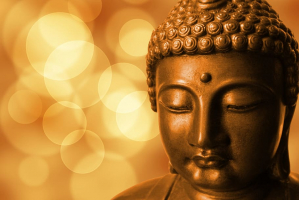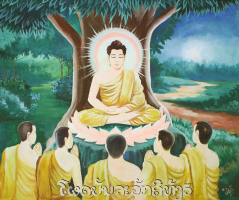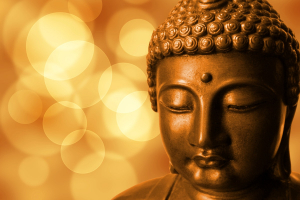Top 10 Major Beliefs Of Buddhism
With its profound philosophy and rich spiritual heritage, Buddhism encompasses ten major beliefs that form the essence of its teachings. These fundamental ... read more...principles are the guiding lights illuminating the path toward wisdom, compassion, and enlightenment. Let us explore the ten major beliefs of Buddhism, each offering invaluable insights into the nature of existence and the pursuit of inner peace.
-
Right Understanding (Samma Ditthi) holds a central place among the major beliefs of Buddhism, constituting the foundational element of the Noble Eightfold Path—a fundamental framework for Buddhist practice. It underscores the significance of cultivating a correct and profound insight into the nature of reality, particularly concerning the Four Noble Truths.
Right Understanding is paramount as it grants individuals a lucid perspective on the genuine essence of existence, enabling them to grasp the nature of suffering, its origins, and the path to liberation from suffering. By comprehending the Four Noble Truths, practitioners gain profound insights into the impermanence and interconnectedness of all phenomena, fostering a deeper understanding of the human experience.
Right Understanding transcends theoretical knowledge, becoming a lived experience that directs practitioners toward compassionate and skillful actions. It empowers individuals to make informed decisions, engage in ethical behavior, and cultivate wisdom as they embark on their journey toward enlightenment and liberation from the cycle of suffering (samsara).

Photo on Pixabay (https://pixabay.com/photos/buddhism-monk-temple-panorama-2214532/) 
Photo on Pixabay (https://pixabay.com/photos/monk-meditation-hands-posture-yoga-7465763/)) -
Right Viewpoint (Samma Drishti) is a pivotal belief in Buddhism and constitutes an essential aspect of the Noble Eightfold Path, the fundamental framework guiding Buddhist practice. It centers on adopting an accurate and insightful perspective on life, the world, and the self.
Critical aspects of Right Viewpoint include recognizing the law of karma, which states that every action has consequences. This belief highlights the principle of cause and effect, where wholesome activities lead to positive outcomes, while unwholesome actions result in negative consequences. Right Viewpoint emphasizes the profound impact of our choices and actions on our well-being and the interconnectedness of all beings in the web of cause and effect.
Another important aspect of Right Viewpoint is embracing impermanence: acknowledging all phenomena' impermanent and ever-changing nature. Right Viewpoint emphasizes that nothing is permanent, and all conditioned things are subject to rising and passing away. This understanding enables practitioners to develop a sense of detachment from the transient nature of the world and fosters a deeper appreciation for the present moment.
Through the cultivation of the Right Viewpoint, practitioners develop a wise and accurate perspective on life, laying the groundwork for skillful actions and ethical conduct. This pivotal belief in Buddhism enables individuals to perceive reality more clearly, guiding them toward compassion, wisdom, and spiritual growth. It fosters a profound understanding of the interconnectedness of all beings and the impermanent nature of existence, ultimately leading to the pursuit of enlightenment and freedom from suffering. The right Viewpoint is a transformative compass, illuminating the path toward inner peace and liberation.

Photo on Pixabay (https://pixabay.com/photos/eat-asia-burma-belief-boy-buddha-1807509/) 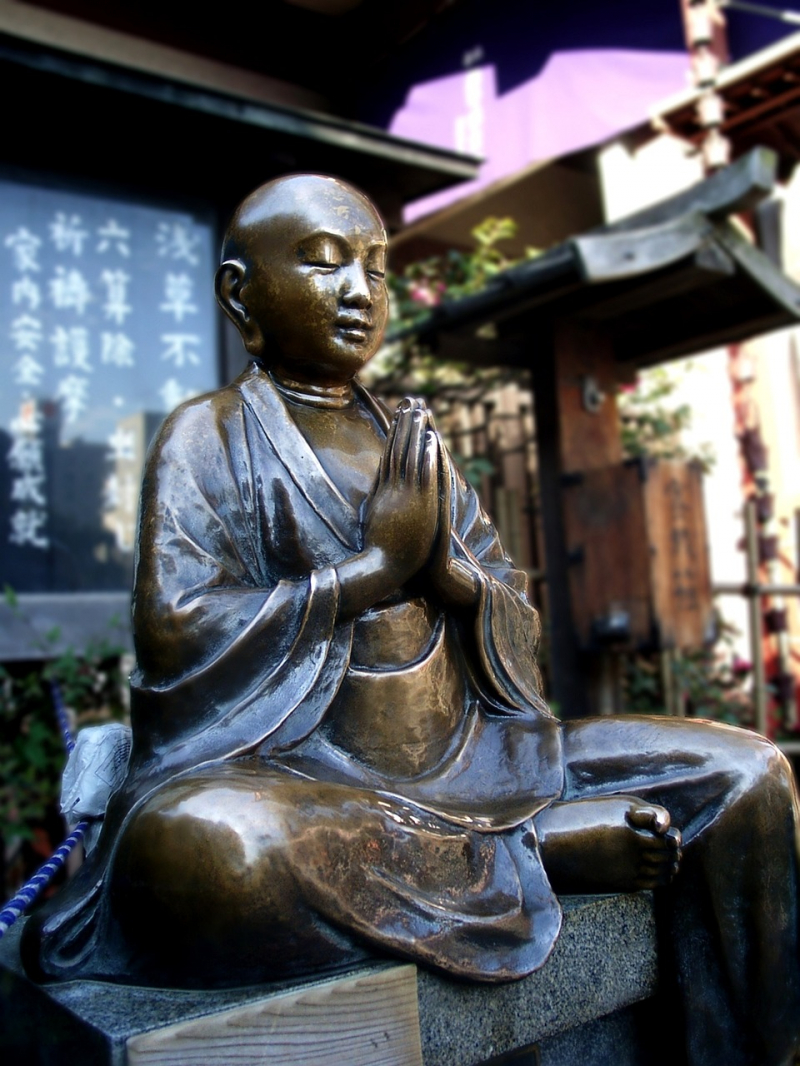
Photo on Pixabay (https://pixabay.com/photos/monk-religion-statue-for-monks-1600052/) -
In Buddhism, the Right Values and Attitudes are emphasized as part of the Noble Eightfold Path, a fundamental framework for ethical and mental development that leads to the cessation of suffering and the realization of enlightenment. Within this path, the right values and attitudes guide practitioners toward a more virtuous and awakened way of living.
Right Values, also known as Right Intention (Samma Sankappa), is a foundational belief in Buddhism and a core component of the Noble Eightfold Path. It pertains to the ethical and mental dimensions of the path, focusing on nurturing virtuous intentions and attitudes. Right Intention emphasizes the cultivation of wholesome aspirations and a compassionate approach to life.
Right Attitude, encompassing Right Speech (Samma Vaca) and Right Action (Samma Kammanta), holds great importance in Buddhism as a vital aspect of the Noble Eightfold Path. It emphasizes practitioners' ethical conduct and behavior, guiding them to cultivate daily virtuous actions and wholesome speech.
Practitioners diligently strive to cultivate intentions that embody non-harming (ahimsa) towards oneself and others. This involves relinquishing violence, aggression, and choices that may inflict harm or suffering upon sentient beings. Instead, they foster an attitude of compassion and empathy, seeking to promote well-being and harmony in all interactions.
By cultivating the Right Values and Attitude, practitioners align their intentions with ethical principles and wholesome qualities, fostering a compassionate and honest approach to life. This core belief of Buddhism supports the development of a virtuous and harmonious mind, leading to personal growth and the well-being of all beings. Right Values and Attitude serve as a guiding light for ethical conduct, nurturing a mindset of empathy, kindness, and altruism, creating a positive impact on oneself and the world.

Photo on Pixabay (https://pixabay.com/photos/boy-monk-pray-asia-burma-belief-1822473/) 
Photo on Pixabay (https://pixabay.com/photos/children-to-novice-traditional-1822483/) -
Right Speech, known as Samma Vaca, is a fundamental belief in Buddhism and a crucial aspect of the Noble Eightfold Path. It centers on the ethical and mindful use of speech in daily interactions and communication. Practitioners are encouraged to speak truthfully and honestly, avoiding falsehood and deceit in their words.
Right Speech advocates using words embodying kindness, gentleness, and compassion. It encourages practitioners to avoid harsh or hurtful speech in their interactions with others.
Buddhists are wisely counseled to abstain from gossiping or engaging in speech that may lead to division and discord. Instead, practitioners are encouraged to avoid indulging in unnecessary and idle chatter, speaking with thoughtfulness and purpose in their communication.
Through the cultivation of the Right Speech, practitioners aim to nurture skillful communication that fosters understanding, harmony, and empathy. This core belief in Buddhism empowers individuals to wield their words for positive and constructive purposes, fostering improved relationships and contributing to a more compassionate and peaceful society. Right Speech plays a vital role in spiritual practice, guiding practitioners towards a mindful and ethical way of expressing themselves in the world.

Photo on Pixabay (https://pixabay.com/photos/buddhists-monks-orange-robes-456286/) 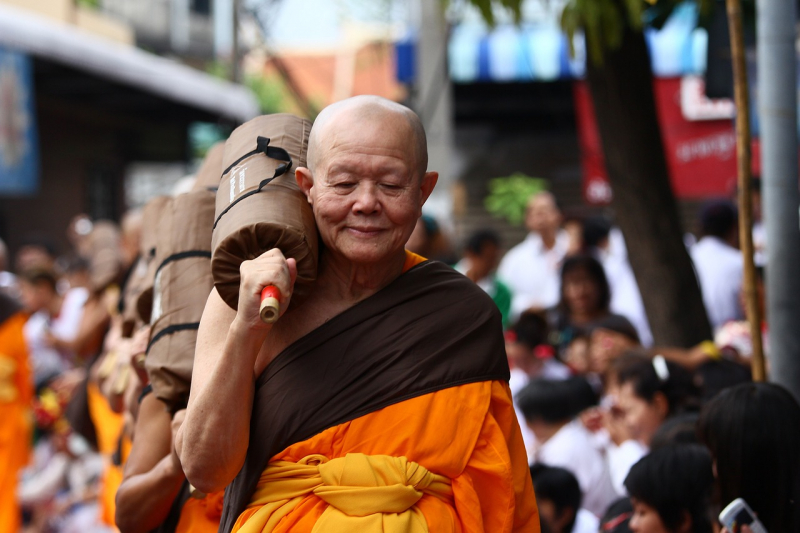
Photo on Pixabay (https://pixabay.com/photos/buddhists-monks-walk-robes-orange-458909/) -
Right Action, referred to as Samma Kammanta, holds significant importance in Buddhism as a crucial element of the Noble Eightfold Path. It centers on guiding practitioners toward ethical conduct and virtuous behavior in their day-to-day lives. Right Action includes the principle of Non-harming, nonviolence, Honesty, and Integrity.
The principle of Non-harming, known as Ahimsa, is of utmost importance in Buddhism. It urges practitioners to embrace a compassionate lifestyle and abstain from engaging in actions that cause harm to themselves or others. By adhering to this ethical principle, individuals strive to avoid any deeds that may lead to physical or emotional suffering, cultivating an environment of kindness and harmony in both their inner world and the world around them.
Right Action, as a fundamental principle in Buddhism, encourages practitioners to embrace the practice of non-violence and cultivate boundless compassion toward all living beings. It calls for a profound reverence for life in all its forms, urging individuals to respect the lives and well-being of every sentient being, from the tiniest insects to the majestic creatures that roam the earth.
By cultivating Right Action, practitioners wholeheartedly strive to uphold ethical behavior and moral conduct, recognizing the profound impact of their actions on both personal well-being and the well-being of others. This pivotal belief of Buddhism serves as a steadfast guiding principle, leading individuals towards a wholesome and virtuous life, with each step paving the way to a more compassionate, just, and harmonious world.
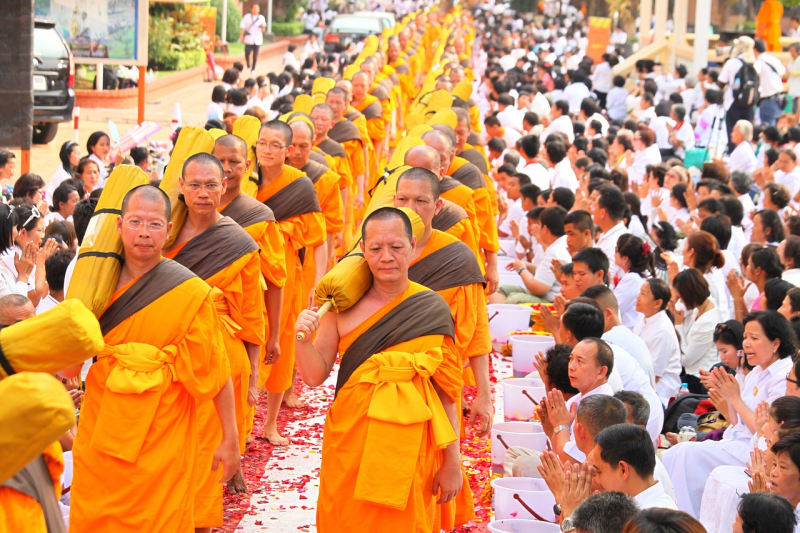
Photo on Pixabay (https://pixabay.com/photos/buddhists-monks-orange-robes-456269/) 
Photo on Pixabay (https://pixabay.com/photos/buddha-statue-zen-china-buddha-3434541/) -
Right Livelihood is one of the central beliefs of Buddhism. It emphasizes the importance of earning a living in a morally sound way that aligns with the principles of non-harm, honesty, and compassion. Engaging in the right Livelihood is crucial for creating a harmonious and ethical society and cultivating a mind free from guilt and remorse.
Practitioners are encouraged to avoid engaging in professions or activities that directly harm sentient beings, including killing, hunting, or trading weapons and poisons. Additionally, this principle extends to refraining from occupations linked to human trafficking, slavery, or the reckless exploitation of natural resources.
Right Livelihood embodies honesty, transparency, and integrity in all professional interactions. Embracing occupations that bring forth beneficial contributions to society, foster well-being, and uphold sustainable principles is strongly advocated. This could encompass healthcare, education, social services, and environmental conservation roles.
It is worth noting that the understanding and implementation of the Right Livelihood can differ across various Buddhist traditions and cultural settings. Nonetheless, the core principle remains unwavering: to participate in occupations that uphold ethical values and prevent harm, thus playing a role in fostering a world characterized by compassion and justice.

Photo on Pixabay (https://pixabay.com/photos/dalai-lama-tibet-buddhism-lama-2244829/) 
Photo on Pixabay (https://pixabay.com/photos/teeth-dental-smile-white-teeth-977208/) -
Non-self, also known as Anatta, is one of the major beliefs of Buddhism and a fundamental concept in understanding the nature of reality and human existence. Anatta is the absence of a permanent, unchanging, independent self or soul (atman) within individuals and all phenomena.
In Buddhism, the idea of non-self challenges the conventional notion of a fixed and enduring self. Instead, it emphasizes the impermanence and interdependence of all things. According to the doctrine of Anatta, all conditioned phenomena, including thoughts, feelings, perceptions, and physical bodies, are subject to constant change and lack inherent, autonomous existence.
The realization of non-self is considered crucial for attaining enlightenment and liberation from the cycle of suffering (samsara). By understanding and internalizing the doctrine of Anatta, individuals can break free from the illusion of a separate and fixed self, leading to a profound shift in perspective and a deeper connection to the interconnectedness of all life.
In summary, non-self (Anatta) is a central and transformative belief in Buddhism, emphasizing the impermanence and interdependence of all phenomena. Through understanding and internalizing this concept, practitioners can liberate themselves from the bondage of the ego and cultivate a deeper sense of compassion and interconnectedness with all beings. Non-self is a key element in the journey towards spiritual awakening and the pursuit of enlightenment in Buddhism.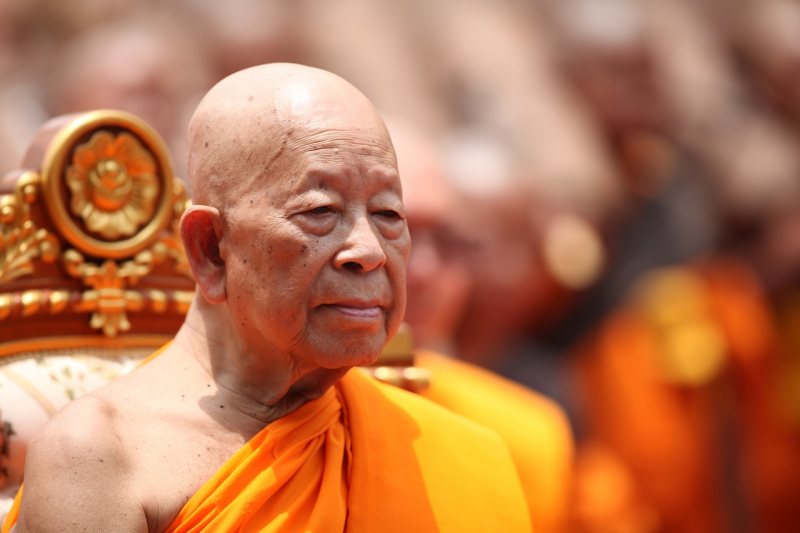
Photo by Pixabay (https://pixabay.com/photos/supreme-patriarch-buddhists-464519/) 
Photo by Pixabay (https://pixabay.com/photos/buddhism-buddhists-praying-1099491/) -
Impermanence, also known as Anicca, is a fundamental belief in Buddhism and a core concept in the Buddha's teachings. It encompasses the notion that all conditioned phenomena are subject to continuous change and transience, emphasizing the impermanent nature of existence.
According to the doctrine of impermanence, all things in existence undergo a constant change; nothing remains the same. Everything arises, persists for a time, and eventually ceases to exist, including physical objects, mental states, relationships, and even the universe. Impermanence is not confined to the external world but extends to the human experience, encompassing emotions, thoughts, and perceptions.
The recognition of impermanence is foundational to the Buddhist path to enlightenment. Through understanding the impermanence of all things, individuals gain profound insight into the nature of existence and recognize the impermanence of suffering (Dukkha).
Embracing the impermanent nature of reality can lead to greater mindfulness and a heightened appreciation of the present moment. By acknowledging impermanence, Buddhists seek to detach themselves from the craving for permanence, which liberates them from the distress caused by clinging and aversion. This wisdom helps find inner peace and freedom from suffering, enabling practitioners to live more fully and authentically in each passing moment, embracing life with a profound sense of wonder and serenity.

Photo on Pixabay (https://pixabay.com/photos/boy-monk-river-buddhist-water-1807518/) 
Photo on Pixabay (https://pixabay.com/photos/boys-monks-river-ritual-water-1793421/) -
Loving-kindness, widely recognized as Metta in Buddhism, is a foundational belief and pivotal tenet in Buddha's teachings. It encompasses nurturing limitless, unreserved affection and benevolence toward every sentient being, free from any form of discrimination or exception. Metta takes place among the Four Immeasurable Minds (Brahma Viharas) alongside compassion, empathetic joy, and equanimity, forming an essential tapestry of transformative qualities to foster profound spiritual development.
Embracing loving-kindness entails cultivating a heartfelt sense of goodwill, warmth, and genuine care for oneself and all living beings. This practice transcends the boundaries of familial and friendly connections to encompass even strangers and adversaries. Metta meditation, a widely adopted Buddhist custom, employs purposeful phrases or intentions to nurture feelings of profound love and compassion towards oneself and others, forging a path of inner harmony and interconnectedness.
The essence of loving-kindness finds its profound roots in acknowledging interconnectedness and the intrinsic dignity and value present within every living being. Through cultivating loving-kindness, Buddhists aspire to dismantle the walls of ego, selfishness, and hatred, fostering an atmosphere of harmony, tranquility, and comprehension among individuals and societies. This noble practice benefits the well-being of others. It assumes a pivotal role in guiding the practitioner's path toward liberation from suffering and the attainment of enlightenment, a journey of self-discovery and profound realization.

Photo on Pixabay (https://pixabay.com/photos/monk-walking-rose-petals-buddhism-458491/) 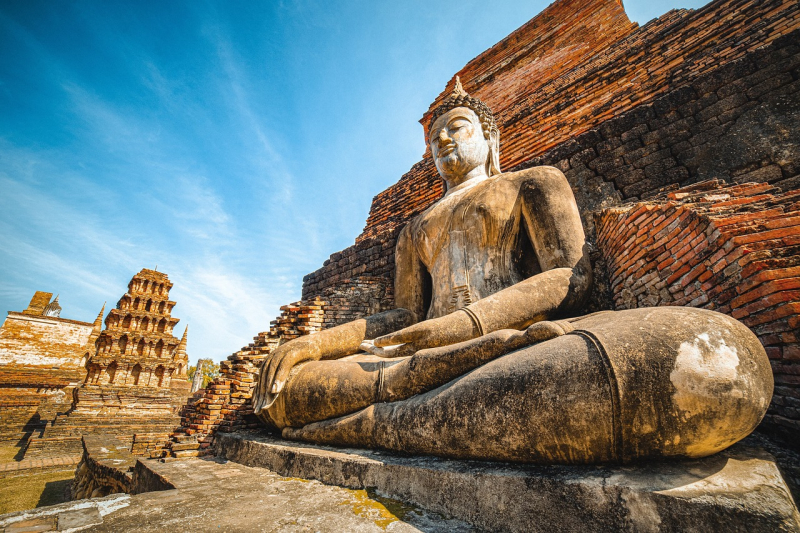
Photo on Pixabay (https://pixabay.com/photos/buddha-statue-thailand-buddhism-5641534/) -
Non-violence, commonly known as Ahimsa, holds a significant place among the core beliefs of Buddhism. The term "Ahimsa" is of Sanskrit origin, signifying "non-violence" or "non-harming." This foundational principle resonates across diverse religious and philosophical traditions, particularly prominent within Buddhism.
The teachings of the Buddha in Buddhism deeply instill the principle of non-violence. Buddhists are encouraged to avoid causing harm or resorting to violence against sentient beings, whether humans or animals. This sacred principle finds its roots in the profound understanding of the interconnectedness of all life and the inherent value and dignity present in every living being.
Ahimsa's practice transcends physical violence and encompasses avoiding harmful actions, speech, and even unwholesome thoughts. Buddhists diligently nurture compassion and kindness towards all living beings, fostering an environment of peace and harmony in their interactions with others and the world at large.
Within Buddhist teachings, the dedication to non-violence is vital in the Eightfold Path. This central and guiding principle offers ethical and moral guidelines for conduct. Through the embrace of non-violence, Buddhists aspire to fashion a world imbued with compassion and benevolence, nurturing spiritual growth and inner peace for themselves and all beings around them.

Photo on Pixabay (https://pixabay.com/photos/buddha-buddhism-statue-religion-525883/) 
Photo on Pixabay (https://pixabay.com/photos/temple-prayer-wheel-buddhism-5619197/)













